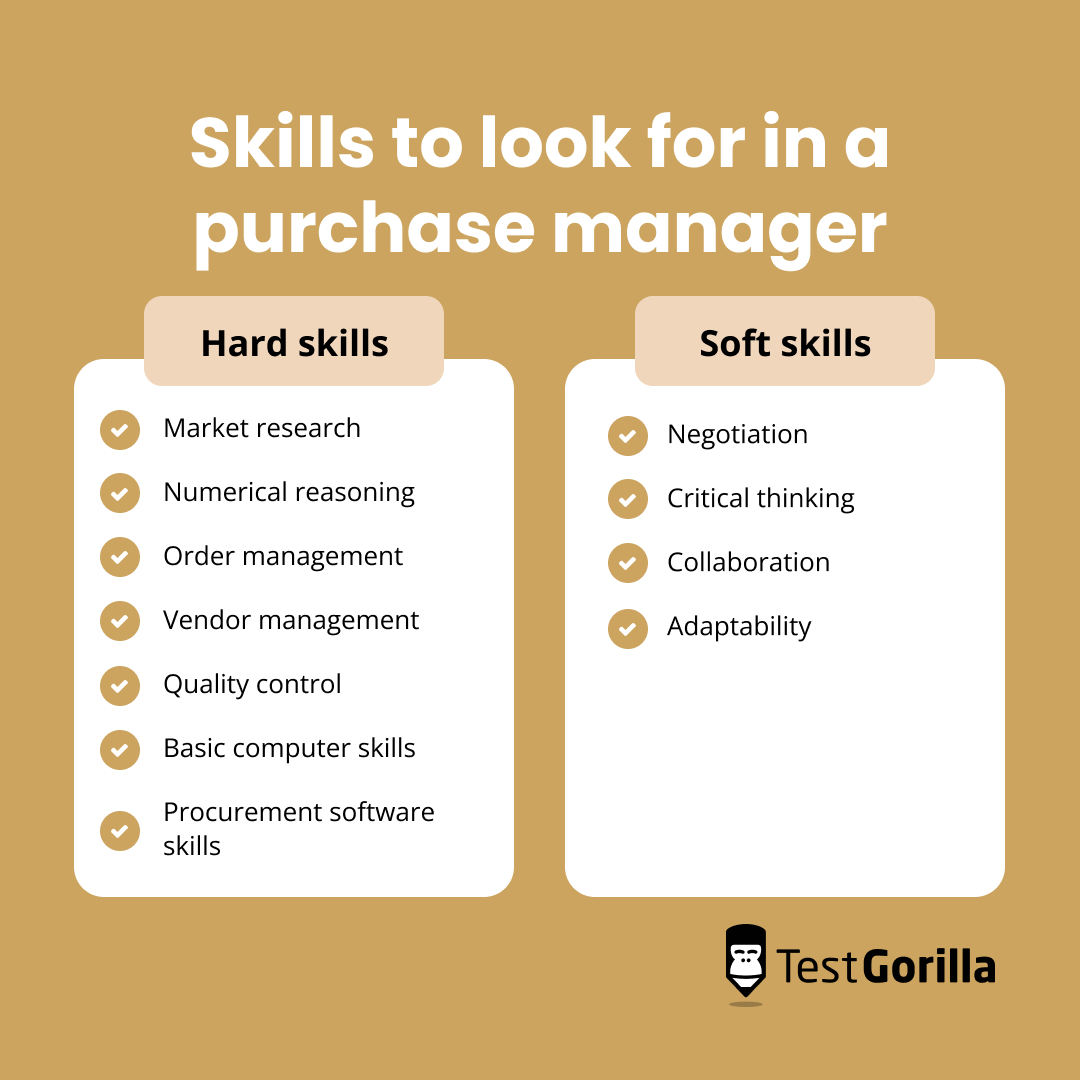A skilled purchase manager makes cost-effective, high-quality procurement decisions, which is key to profitability. Therefore, to ensure your company’s success, hiring the right candidate is essential.
Identifying the qualifications, skills, and necessary prior experience required for your role will avoid hurting your bottom line and wasting valuable resources from mis-hiring.
In this guide, we list the big do’s and don’ts of hiring a purchase manager, crucial skills to assess, creative ways to source applicants, and how assessment platforms like TestGorilla help you find your star candidates.
Table of contents
- What you need to know before hiring a purchase manager
- Skills and qualifications to look for in a purchase manager
- Where to find skilled purchase managers
- How to select the best purchase manager candidates
- Common mistakes when hiring a purchase manager
- Hire your next purchase manager with TestGorilla
What you need to know before hiring a purchase manager
Tick off these considerations before you start your recruitment campaign.
Ensure there’s a business need
Hire a purchase manager when there’s a clear need for the role. Otherwise, they may perform tasks unrelated to their job or become unproductive, increasing overhead costs and lowering team morale.
You may need a purchase manager when:
You’re onboarding new suppliers
Your procurement team is stretched, affecting purchase quality
You’re lacking specialized knowledge or skills, such as overseas supply chain management
Clarify the basic requirements in your job description
Purchasing is a distinct activity within procurement. Yet, it can have various focus areas depending on business needs. You should detail primary responsibilities and tasks in your purchase executive job description. This will help you avoid attracting unsuitable applicants and making a mis-hire.
For example, a job description for an overseas procurement specialist may include researching international supply chains, ensuring local compliance, negotiating contracts, and tracking inventories.
Additionally, you may want to add industry experience requirements. For instance, specialized supply chains like those in construction or medicine may warrant prior experience to meet quality and compliance standards.
Choose an appropriate compensation level
Aim to hit a compensation sweet spot to attract top-level applicants and ensure your best candidate accepts your offer.
Glassdoor estimates the average base salary for a purchasing manager is $83,165 per year. To ensure you’re offering the right level of compensation, check your competitors’ by filtering job board ads by relevant job titles. Compare like for like in terms of seniority and responsibility.
Aim to offer more than your competitors to attract the best talent. Add benefits such as performance bonuses, generous paid time off, and parental leave as an extra incentive.
Discover more ideas in our guide on competitive compensation.
Skills and qualifications to look for in a purchase manager
You want your next purchase manager to have a bachelor’s degree and relevant prior experience in purchasing, procurement, or supply chain management.
In addition, assess a combination of soft and hard skills to ensure the candidate approaches their responsibilities holistically.
Look for applicants who possess the following:
Hard skills
Market research: Using online information and professional networks to identify suitable vendors and products/services according to business needs.
Numerical reasoning: Performing quick and accurate estimates for budgets, invoices, and performance metrics while effectively interpreting tables and charts.
Order management: Tracking and processing orders and inventories, plus filing and paying invoices.
Vendor management: Managing supplier audits, prices, contracts, onboarding, and communications.
Quality control: Measuring and analyzing performance metrics to compare contractual to actual product/service quality.
Basic computer skills: Easily perform tasks like web browsing, emailing, and using Microsoft Excel and Word.
Procurement software skills: Ensuring purchase approvals, creating purchase orders, updating vendor records, sending quote requests, and paying invoices.
Soft skills
Negotiation: Using bargaining tactics to optimize order price and volume as well as product/service quality and features.
Critical thinking: Making logical, solution-driven decisions when identifying and evaluating vendors.
Collaboration: Building mutually beneficial relationships with suppliers and coordinating purchasing tasks with internal stakeholders, including legal and finance departments.
Adaptability: Proactively seeking alternatives in response to supply chain disruptions, supplier underperformance, and other obstacles.
Where to find skilled purchase managers
You’ll increase your chances of finding the right purchase manager by using multiple sourcing strategies simultaneously.
Start by:
Advertising on job boards: Post your job ad on multiple platforms, such as LinkedIn and ZipRecruiter. Additionally, browse individual profiles by using search filters like “purchase manager [your industry].”
Using recruitment agencies: Look for agencies with experience in placing purchasing manager candidates. You could search online for specialist agencies using terms like “procurement recruitment agency” and ask different agencies for quotes.
Incentivizing employee referrals: Your staff could have procurement talent in their networks. Set a referral reward, such as a flat fee or a percentage of the new hire’s salary (commonly between 2% and 5%), then advertise the role and referral bonus on your internal communication channels.
3 creative ways to find purchase manager candidates
Find your next purchase manager with the following tips:
1. Browse specialist networking groups
Many purchasing managers share knowledge and experience in specialist networking groups. Join them and check social feeds for individuals with great communication skills and purchasing expertise. For instance, they may have spoken in a webinar or shared an insightful strategy.
Where possible, post your job ad in the group and scan the member list for seniority level and industry.
Tip: Use Ctrl+F or Command+F to quickly search a webpage using keywords.
Here are some procurement groups you could join.
LinkedIn purchasing and procurement groups, such as the Purchasing and Global Supply Chain Professionals group (155,000+ members) and the Sourcing and Procurement Group (115,000+ members).
Private communities, such as Procurious (44,000+ members).
Subreddits on procurement, such as r/procurement (7,300+ members) and r/supplychain (60,000+ members).
2. Network at procurement events
Procurement events offer a strategic way to meet potential purchase manager candidates.
For instance, you could attend international conferences like the World Procurement Congress, national events like Supply Chain USA, and industry-specific gatherings like the Retail Supply Chain Conference.
While there, network with speakers, panelists, and attendees, and make a note of contacts possessing the skills and experience for your role. Reach out to them soon after the event to arrange a conversation about the position.
3. Advertise with procurement associations
Many purchasing managers check procurement associations’ job boards for new openings. Post your job ad with groups such as:
American Association of Procurement, Supply Chain and Tourism Management (AAPSCM)
Some professional bodies may permit access to member profiles and contact details, so consider headhunting suitable candidates as well.
How to select the best purchase manager candidates
Two-dimensional resumes and rehearsed interview answers alone aren’t enough to select your ideal purchase manager. That’s why testing candidates’ knowledge and abilities in a measurable way is essential.
Talent assessment platforms, like TestGorilla, make it quick and easy to identify skilled individuals and provide a bias-free and data-backed ranking of your top scorers.
Incorporate up to five tests per assessment and create custom questions tailored to your role. For instance, you could include industry-specific questions to check relevant supply chain know-how.
Consider combining the following tests to shortlist purchase managers:
Role-specific tests, such as the Purchasing Manager test, Overseas Procurement Executive test, and the Purchase Executive (Local Procurement) test.
General computer skills tests, including computer literacy for PC and Mac, and Windows and macOS navigation.
Software tests checking experience with Xero and Microsoft Excel, Word, and Outlook.
Cognitive ability tests, such as those for critical thinking and numerical reasoning.
Situational judgment tests, including those assessing communication, negotiation, and business judgment.
Personality tests, such as the DISC, Enneagram, and 16-Types.
Interviewing tips
During interviews, ask both behavioral and scenario-based interview questions to assess specific skills, like collaboration and vendor management, for example.
Behavioral questions explore past achievements. For instance, you might ask, “Tell me about a time when your company’s supply chain experienced a disruption. How did you react?”
Meanwhile, scenario-based questions ask candidates to explain their approach given a hypothetical situation. For example, “Imagine a vendor’s recent inventories have been underperforming. What would you do to ensure our inventory needs are met?”
You can use TestGorilla’s one-way interview feature to record and replay candidates’ answers before progressing to two-way conversations. Customize your questions, set time limits, and playback on any device.
Common mistakes when hiring a purchase manager
Here’s what to avoid when recruiting a purchasing manager.
1. Not assessing soft skills
Purchase managers need excellent hard skills, including market research and quality control.
However, failing to assess soft skills, like collaboration, negotiation, and critical thinking, could result in a costly mis-hire. For instance, poor relationship management can lead to higher supply costs or lower-quality supplies.
2. Overlooking discomfort with technology
When you do assess hard skills, you might be tempted to prioritize traditional purchasing skills, such as order and vendor management.
However, you must also check candidates’ comfort levels with technology, particularly spreadsheets, emails, and purchasing software like Tipalti or Precoro, for instance. This helps avoid financial and productivity losses due to making mistakes or being too slow with software.
3. Neglecting industry experience
Finally, don’t underestimate first-hand industry experience. It’ll help your purchase manager collaborate more easily with your vendors and avoid ordering inappropriate products or services.
Our tips for testing industry experience are:
Ask industry-related interview questions like, “Tell me about a time when your [insert industry] experience helped you achieve a purchasing target.”
Create a custom test on your assessment platform that evaluates industry-specific purchasing knowledge. (TestGorilla’s anti-cheating measures help ensure your candidates don’t get outside help with their tests.)
Conduct a case study meeting with your shortlisted candidates. After providing a purchasing scenario – say, identifying an international supplier to cut costs – ask candidates to prepare plans, calculations, or presentations. In their approach, look for evidence of industry know-how, such as pricing and quality standards.
Hire your next purchase manager with TestGorilla
Finding a great purchase manager for your business means getting well-negotiated vendor contracts, lower supply prices, and efficient collaboration with other internal teams.
Identifying the right skills and requirements for your role is important– some will depend on your business needs. For instance, you may prioritize candidates’ industry experience due to specialized supply chains.
With TestGorilla, you can send custom assessments to your purchase manager applicants, including tests evaluating purchasing skills, critical thinking, software knowledge, and more. Our data-driven ranking system will point you to the most skilled candidates in your pool so you can confidently progress them to the next stage.
Learn more about the benefits of skills-based hiring on our blog.
To explore TestGorilla’s talent assessment features, check out our prerecorded product tour or schedule a free live demo with our team today.
Ready to give TestGorilla a go? Register for a free TestGorilla account now.
Related posts
Hire the best candidates with TestGorilla
Create pre-employment assessments in minutes to screen candidates, save time, and hire the best talent.
Latest posts
The best advice in pre-employment testing, in your inbox.
No spam. Unsubscribe at any time.

Hire the best. No bias. No stress.
Our screening tests identify the best candidates and make your hiring decisions faster, easier, and bias-free.
Free resources
This checklist covers key features you should look for when choosing a skills testing platform
This resource will help you develop an onboarding checklist for new hires.
How to assess your candidates' attention to detail.
Learn how to get human resources certified through HRCI or SHRM.
Learn how you can improve the level of talent at your company.
Learn how CapitalT reduced hiring bias with online skills assessments.
Learn how to make the resume process more efficient and more effective.
Improve your hiring strategy with these 7 critical recruitment metrics.
Learn how Sukhi decreased time spent reviewing resumes by 83%!
Hire more efficiently with these hacks that 99% of recruiters aren't using.
Make a business case for diversity and inclusion initiatives with this data.


















